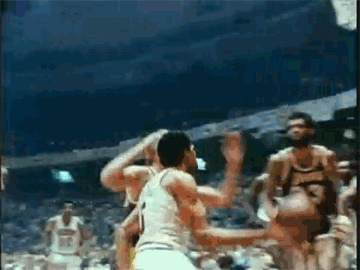Here’s a treat for you. From our pal Mark Jacobson comes a 1990 Esquire profile on Jackie Mason. Originally titled “Enough with the Resurrections, Already!” the story appears here with the author’s permission.
As the stretch limo barrels through the bleak winter light up Route 17, Jackie Mason knifes his stubby fingers through the climate-modulated air. “You must be some kind of putz! That is the most idiotic thing I’ve heard in thirty years!” Jackie assails. “Why do you think if a Jewish girl has a big nose she immediately cuts it off? An Italian girl or a gentile from Wyoming, if she has a little extra nose, she won’t slice it off in a second! You think it’s an accident that Jewish girls have more nose jobs?”
“Maybe it’s a generational thing,” I meekly riposte.
Mason rolls his milk-blue eyes. “One jerk-off remark after another! Oh… because you’re so young and I’m so old, I don’t know what I’m talking about? Schmuck! My whole life is chasing twenty-five-year-old girls!” Mason appeals to the others in the pseudoplush vehicle. “You! What do you think?” he queries the radio announcer. “How about you?” he polls the squirrelly insurance purveyor. Assent is immediate, unanimous: To banish a Jewish girl from Bloomingdale’s makeup counter is tantamount to plunging a nail file into her heart. Jackie is right, I am wrong. Mason raises his puff palms to the ceiling. “See!” Case closed. Then he crams a cracker into his mouth, follows it with a grape, and he’s ready for the next topic of discussion.
That’s how it is with Jackie. If you are exhibiting putzlike behavior, entertaining a schmuck concept pertaining to, say, the quality of an Italian restaurant or the relative hand speed of certain prizefighters, or—God forbid—revealing the pathetic liberal tendencies of a typical Jew wussy regarding personages like Jesse Jackson, Jackie is more than willing to sever these woeful afflictions from your person with his howitzering wit. He’s not crazy about the color of your tie either. He doesn’t have to know you very well to dispense these opinions; Jackie’s a gnomish Übermensch, his commentary is universal, available and applicable to all. Once, he buttonholed Strom Thurmond in the Senate dining room and spared the antique former segregationist no quarter on the subject of “underage women.” But Jackie would have done the same to a bum in the street. Populist to the core, he plays no favorites.
The first time you meet him, perhaps backstage, after a show, his shirt off, loose white skin on his tiny, vaguely shaped chest filmed with sweat, Jackie rotates his globular head on an invisible neck, rocks back on his heels, looks you up and down. Are you for me or against me? is the question. The answer is: Who cares? You can be friend for life and he’ll still call you up in the middle of the night to tell you what garbage your dreams are.
With Jackie, there’s always something mies going on. A tumult. People he’s not talking to. Bridges left burned and blown apart like the one over the River Kwai. Today he’s calling one deli owner a “little Hitler” because he wouldn’t give him an extra pickle; tomorrow he’ll be saying another proprietor is a “Mussolini” because he gave him too many pickles. Forget the third place, he’s suing them, or are they suing him? Edgy self-destruction is a recurring theme in Jackie’s remarkable career. How many other entertainment figures have managed, within the space a single decade, to be banished from the big-time airwaves for allegedly giving Ed Sullivan the finger on live national television and to be shot at for repeated public razzing of Frank Sinatra, in Vegas no less. In Miami Beach, a large man warned him to lay off Frank, then broke his nose and crushed his cheekbones. But did that stop Jackie from claiming, in his act, that Ol’ Blue Eyes put his teeth in a glass before he mounted Mia Farrow? You don’t know Jackie.
That Jackie! Can’t accuse him of ducking anyone. Fools may rush in, but they eat Jackie’s dust. He’s around sixty now, but time hasn’t dulled his boyish impulsiveness one bit. This fact was made clear in the 1989 New York mayoral election. Suddenly back from show-biz oblivion, a homegrown Prince of the City due to his Tony Award-winning one-man show, The World According to Me—which he will reprise in October as Jackie Mason: Brand New—Jackie proceeded to embroil himself in much tsores. Acting as Republican Rudolph Giuliani’s “honorary campaign manager,” he was quoted as calling eventual winner David Dinkins, who is black, “a fancy schvartzer with a moustache.” Closely following the racially motivated murder of a black teenager in the nearly all-white section of Bensonhurst, l’affaire du schvartzer dominated the tabloid pages for weeks, sparking much contention, scholarly and otherwise, as to the exact connotation of the Yiddish word (which means literally, black, but is often used in a far more pejorative sense). Under fire, Giuliani, a stern but tongue-tied former D.A., courted jocular Jackie in hopes of winning the pivotal Jewish voting block, unceremoniously jettisoned the comic from his campaign.
Several weeks after this, episode, Jackie’s TV show, Chicken Soup, his supposed “breakthrough” into every gentile’s living room, was canceled. Did the schvartzer business kill the program? inquiring minds wanted to know. To paraphrase the old Yiddish joke, it didn’t help. But really, the show was a turkey, incongruously paired opposite the bulky British earth mother Lynn Redgrave, Jackie tried to affect a schmaltz-dripped Mr. Rogers, all the while kvetching he “hated every moment” of his supposed “breakthrough,” that working on the series was like “being in a gulag.”
* * * * *
“No-good Nazi bastards!” Jackie Mason blurts, nonsequiturously, as the limo whizzes past familiar signposts: LIBERTY. MONTICELLO. SOUTH FALLSBURG. We’re headed for the Pines Hotel. Not too long ago, along with Grossinger’s, the Concord, the Nevele, and dozens of others, the Pines was one of the top-line Alhambras of the Borscht Belt, that idyll-with-pastrami summer world that city-choked Jews built ninety miles from New York, in the Catskill Mountains. Now, however, Grossinger’s is gone, bulldozed for condos. Many others met similar fates. To make it these days, several of the remaining Catskill hotels try to represent themselves as swinging-singles spots, using ads with blond (gentile) bathing beauties as come-ons.
As he will, Jackie blames his coreligionists for the demise of “the mountains.” “They think of the Catskills and go: ‘Too Jewish.’ So they say there’s nothing to do there. They go to an island instead. ‘I went to an island,’ they brag, ‘it was so wonderful, there was nothing to do.’ In the mountains nothing is a calamity, but on an island it’s paradise.” Then, with an unexpected exhale of resignation, Jackie looks out the tinted window. It’s “off-season,” true, but South Fallsburg has the mournful look of one of those towns forgotten now that it’s moved off the main road. “What a dump this place has become,” Jackie reflects.
When he first started as a comic back in the late 1950s, Jackie spent summers in “the Jewish Alps,” doing his fledgling act amid indifferent stints as “social director,” a thankless task he describes as “trying to get Jews out of lawn chairs, an impossibility.” Then, later, after the Sullivan “finger” incident, when mainstream club bookers and television producers wouldn’t touch him due to his reputation as “a filthy comic,” Mason returned. In the goyim-inflected world of the cathode ray, he was an outcast, a pariah. But in “the mountains,” he was welcome. He played everywhere. Jews would always laugh at his famous routines, like the one about the doctors (“Crooks, every last one of them! If they’re not, why are they wearing a mask? And gloves? To hide the fingerprints! You ever wonder why you can’t read the prescription? It’s a code, for the pharmacist. It says, ‘I got my money, you get yours!’”).When he said his family was wrecked in the stock-market crash—“A broker jumped out the window, fell on my father’s pushcart”—he got howls.
As the limo pulls into the Pines driveway, there’s a stir. Maybe the hotel isn’t what it used to be, maybe the legendarily copious food now tastes as if it were hijacked from a dozen airplanes, and the “nightclub” looks like a tatty high school auditorium done up for a Las Vegas night; none of that matters. Tonight there’s an electricity, like the time Eddie Fisher first came up on stage, or Jerry Lewis or a hundred others nervy enough to push themselves to the front of the line and say, “Look at me, not him.” Tonight you could close your eyes and believe you saw Marjorie Morningstar flit across the linoleum dance floor. Tonight is special. Jackie Mason is headlining!
And they come, the “regulars,” faces from a hundred bar mitzvahs, from a thousand photos snapped on Grand Concourse, or in Brooklyn, on Eastern Parkway, before those great boulevards “changed” and people speaking Spanish and playing loud radios took over the lobbies and subway stations. A liver-marked man wearing white shoes says he met Jackie in Atlantic City, a red-rinsed lady remembers him from Eden Roc in Miami. “I saw your act at the Concord before you were anyone,” says one person. “I saw you at Grossinger’s even before that,” another one injects in the spirit of vicious oneupmanship. “At Raleigh’s in 1965!” “In Chicago in 1977!” Then come the pictures. Children, grandchildren, great-grandchildren are pushed under Jackie’s bulbous nose.
“Never fails,” Jackie grouches, later, about the picture pushers. “They’re on me, like a pogrom. Do they think I want to look at the two-year-old kid, naked, upside down on a rug? Who is this two-year-old to me? You got a picture of an eighteen-year-old girl, show me that!” But Jackie doesn’t say that to the picture pushers. He smiles, signs autographs, chats, tumles. Suddenly there’s another Jackie, a gracious, accommodating man emerging from beneath the bluster. It is not an act. True, Jackie remains ready to attack at any moment, tell anyone they are a putz, a moron, a scumbag. But not these people. These people love Jackie Mason. And, down deep, he loves them. After all, he eats what they eat, remembers what they remember, thinks what they think. And they’re happy he’s here, because now, at least for tonight, things will be as they once were.
* * * * *
A few days later, over blintzes in a New York coffee shop, I bring up my reminiscences of the Ed Sullivan incident. Reflexively, Jackie’s hackles rise, his gaze congeals to a bale. This is no surprise. Even though Jackie’s sworn version of the celebrated “You got a finger for me, I’ve got a finger for you” incident has been “proven” to be accurate (on a Barbara Walters 20/20 segment no less—from the tape you can see Mason was mad at Sullivan, but at no time did he extend a middle finger), it is clear the comedian hasn’t completely distanced himself from the most paroxysmal moment of his tempestuous career. “I blame the Jews,” Jackie blurts, two and a half decades later. “The next day every Jew said they saw me do a filthy gesture. There was no filthy gesture. But it made them happy to see a big man wiped out.”
Leaving aside the subtext of this archetypal TV moment—that is, while it would have been impossible to misconstrue someone like Bob Hope, or George Jessel, or even some patent “wild man” like Don Rickles giving the all-powerful Ed Sullivan the finger, the notion of a pushy mocky like Jackie Mason doing it was perfectly believable—I decide to take another tack. “I bet the Sullivan thing was your biggest break at least in the long run.”
That gets Jackie going. His doughy face blushes, his fireplug body rises like a blocky hovercraft above the blintzes, and he’s pacing around the deli. Elderly waiters carrying cups of hot coffee are forced to perform Pirouettes to dodge the bantam star. “Schmuck! How could something that loused up my career for twenty-five years be my biggest break? What kind of morbid bastard are you?”
Actually, I was only trying to help. As Jackie has said, “A Jew assumes every question is answerable, except he’s just not smart enough to know what that answer is.” For Jackie, at least since his “overnight success” on Broadway, the question has been, “Why now? Why, after doing the same thing I’ve been doing for thirty years, should I be a hit?”
Consider, for instance, the historical perspective: 1956, after all, when Jackie Mason first began telling jokes for money at the Pearl Lake Hotel, in Parksville, New York, was another time altogether. Wood-encased Philcos had begun to figure in the furniture scheme of Bronx apartments alongside the plastic-covered sofas, but the Tube hadn’t yet centerpieced itself as the arbiter of American social life. Many of the great Jewish comics, like George Burns, Jack Benny, and Groucho Marx, had already crossed over, regimmicking their well-honed personas to accommodate the new medium. Others, like Milton Berle, Ernie Kovacs, and Sid Caesar, with their most prominent writers, people like Mel Brooks and Carl Reiner, were more instrumental in orchestrating the coming idea of a nationwide spectacle. Then there were the stand-ups, tightly wound hand wringers mutated from the line of traditional badchanim, or jesters, the self-deprecating shtetl merrymaker who had been a staple of Jewish cultural life since the Middle Ages. The comic problem confronting these new talkers was unique. On one hand, they worked in the shadow of the Holocaust and tended toward terminally paranoid, postbomb nihilism; on the other, they were living in America, where, for the first time, it seemed, a Jew didn’t have to keep his bags packed, ready to flee in the middle of the night. In America, a Julius Garfinkle might be a John Garfield; a Bernie Schwarz, Tony Curtis. And there was no reason a Yid couldn’t come springing out the suburban screen door like any Ozzie or Harriet. Amid this vertigo of social mobility, however, many Jews, at least those unable to shake a sense of differentness, found it difficult to separate the (Franz) Kafkaesque from the (Norman) Rockwellesque. Doom behind, assimilation ahead: The existential positioning proved endlessly seductive to the bundled anxieties of this new breed of badchanim. Filtering their impressions through the semisubversive urban bohemianism of the time, they couldn’t wait to tell you all about it.
Of these “candy store” comics (many of them actually hung out in candy stores, most prominently Hanson’s in New York), the stand-ups sought to lay claim to various territory. Shelley Berman was the cerebral neurotic, Mort Sahl the urbane political commentator, Buddy Hackett the eye-rolling buffoon, Woody Allen the psychoanalyzed nebbish-cum-bon-vivant. Then there was Lenny Bruce, who put a new spin on hip by attempting, among other things, the de-demonization of ten-letter words like cocksucker through constant repetition.
Jackie Mason was by far the most “Jewish” of these performers. Although much of his material was standard for the day—gibes at the Kennedys, astronaut jokes, et cetera—looking as he looked, talking as he talked, there was nothing else he could be.
Jackie was the most Jewish of Jewish comics because he was the most Jewish to start with. To fans, the saga is familiar: how Eli Maza, once an eminent rabbi of Minsk, in the Polish-Russian Pale, fled the cossack death squads and wound up, with a surrealness peculiar to the refugee’s journey, in Sheyboygan, Wisconsin, which is where Jackie, then Jacob, the youngest of six children, was born. The elder Maza’s idiosyncratic dream of establishing an enduring Orthodox Jewish congregation on the Midwest Tundra soon faded, and the family moved to the corner of Rutgers and Madison streets on New York’s Lower East Side. It was a lot like Poland on the Lower East Side in those days: “At least a Jew can be a Jew here,” Jackie’s father declared. It was a foregone conclusion that each of the four Maza sons would study in the Yeshiva and become great scholars of the Talmud. For Gabe, Joseph, and Bernie, it was easy. Jackie had other ideas. The only Maza child born in America, Jackie was a wholly different species of ethnic. He felt himself on the threshold of a great new font of information and emotion, a place with streets and smells all its own. This was somewhere to walk around in, to look forward to a future in, not the ephemeral product of a dark and mystic fever, where unfathomable codes could only be kept alive in the brooding minds of men without a country. It is some super-Yiddish amalgam of Golden Boy and The Jazz Singer, the sound of Jackie’s father’s voice thundering through the steamy, soot-caked tenement in the shadow of the Manhattan Bridge, screaming, “Learn! Study!” and Jackie going through the motions, reading the foreign scrolls, but all he wanted to do was buddy-up with sleekly dressed left-hookers like AI “Bummy” Davis and wisecrack with the cigarette-smoking neighborhood k’nakers.
“Every day my father would scream what an ignoramus I was,” Jackie recalls. “My brothers were so much more brilliant than me, he told me. How could I ever come up to them?” After the steady torrent of boom-box enunciation, Jackie becomes nearly inaudible when he talks about how he first became a cantor, and then a rabbi, just as his three brothers did. He led congregations in properly incongruous locales such as Latrobe, Pennsylvania—Arnold Palmer’s hometown—and Weldon, North Carolina. Jackie provides scant details on these episodes. “The past doesn’t interest me,” he says, looking away. “As for trying to remember everything that ever happened to a person, I see it as sick vanity that leads nowhere.” Not that any of this is a deep dark secret. There’s never been a Jackie Mason press kit that omitted the rabbi angle; you can be walking down the street with Jackie or sitting in a restaurant, and all of a sudden, apropos of nothing, he’ll break out in a hosanna. But this is something Jackie has yet to commit to easy shtick. “I did it all to make my father happy, and it was a very painful thing for me, because it was a complete fake. I wasn’t that person, I was someone else.”
He thought he was a star. He knew he was a star: Even at the Pearl Lake Hotel, moonlighting from his busboy job to open for third-rate tumlers who’d exhaust their mother-in-law gags in the first five minutes and subsist on humiliating members of the audience after that, Jackie was certain he was “one of the funniest Jews in the world.” He resigned the rabbinate, changed his name to Jackie Mason, told jokes full time. From then on, everything clicked. He played the big rooms, made the Jack Paar show, became Ed Sullivan’s favorite comic. Until that night….
His agent, friends, family told him to be patient, it would blow over. Soon enough he’d be back in the top clubs, back on the Tonight show. It didn’t happen that way. Even after Sullivan, who screamed he’d make sure the comic “never got on television again,” publicly apologized and asked Jackie back on his show, it didn’t blow over. Like Jackie says, the story was just too sweet; who wanted to believe Jackie Mason didn’t give Ed Sullivan the finger? Then it was into the late Sixties, a completely different dynamic was afoot, and the immigrant’s drama that Mason personified seemed faintly embarrassing, irrelevant.
He didn’t go broke. Recalling his “dead years,” Jackie says, “People would wonder if I was lying in a gutter, rattling a cup, when I was making hundreds of thousands of dollars a year.” But it wasn’t enough. He felt ostracized, an outcast once again. Forever branded as “too Jewish,” he longed to foist his rubber face upon the gentiles, to make them look at him. There were failed Broadway plays, misguided traveling road shows, abortive low-budget movies. The Stoolie, directed by pre-Rocky John Avildsen, a grimy allegory of a local loser, was Jackie’s art picture. It won obscure awards at brand-X film festivals, but, sans jokes, confused the fans who came to laugh, and was met with indifference by everyone else. Most of Jackie’s time in those days was spent trying to induce rich Jews to back his reentry into the big time. Some did not really have money, their own at least. Jackie knew he was walking the nether side, but that didn’t matter. Once, when he was down in Miami playing the Saxony Hotel, Jackie contacted Meyer Lansky, whose son-in-law Mason once utilized as a valet. He asked the myth-shrouded mob genius permission to play his life in a “fictionalized” feature film. Jackie produced the script. Lansky objected to a scene in which his character’s wife gives birth to a child with a clubfoot, then turns to the gangster and says, “This is God’s punishment for your sins,” prompting him to hit her. The film was never made. In 1976, Jackie, with his own money, rented out a decaying boxing arena in Queens, planning to showcase a Vegas-style revue. On opening night it rained. The roof leaked. Umbrellas were opened, but it didn’t help—the sound system didn’t work, no one could hear anything anyhow.
* * * * *
There is a passage in Jackie’s intermittently affecting “autobiography,” Jackie, Oy! in which Mason describes his rabbi father walking down a street on the Lower East Side. “I saw this tragic figure,” Jackie writes, “bent with loneliness, unable to earn enough to feed his family, always with secondhand food in his pocket and secondhand items on his back, taking what charity he could get. Someone gave him a dollar; someone gave him a candle. This tragic figure was my father.” Now Jackie says, “My father lived for an idea. The Talmud was everything to him. It was his life.” Hearing that makes you wonder how Jackie would feel if he saw himself coming out of the New York Deli, walking down 57th Street, wearing not secondhand garments but his usual expensive double-breasted suits and Dior ties. Indeed, there is a melancholy irony in the fact that forty-five years later, Jackie, in a very real way, has filled the role his father used to play for the fresh-from-steerage multitudes. Implicit in Eli Maza’s tirade for his youngest son to “learn” was the notion that he was the heir to a specialized, highly perishable kind of knowledge. Under constant assault from Nazis, cossacks, the relentless churn of the melting pot, and sheer forgetting, what Rabbi Maza knew was a link to another, deeper realm; people needed what he knew, needed to know he knew it. That’s how it is with Jackie, for, as with his father, it seems as if he exists for no other purpose but to deliver his message. Jackie’s message is the Joke.
You take away the Joke and Jackie ceases to exist. He makes a fortune, but doesn’t seem to care very much about money, except in the sense some “sick, phony fuck” might attempt to shyster him out of a nickel. In keeping with the ghetto legacy, he owns no property and doesn’t drive a car. He maintains very little of his former religious life. Aside from an aversion to shrimp (he can’t stand the idea of a fish with feet), he’s not kosher and doesn’t keep the sabbath. He is still close with his family, but says they’ve never really “understood” his life. His brothers—Bernie, the rabbi from Queens, and Joseph, a mohel who, people say, has circumcised half of north Jersey—come to his shows, but Jackie wonders if they “get it.” His manager, the ubiquitous and worshipful Jyll Rosenfeld, acts as his interface with most of the day-to-day humdrum. She picks out almost all his clothes and chose the furniture in the small, spare apartment Jackie has lived in for several years. Once, people say, there was a romantic attachment between the two, but now that’s over. Jackie’s never been married and almost certainly never will be; he’s not interested in children. This is one Jew, at least, who doesn’t seem to care if his line stops here and now. Sure, Jackie will give out his phone number to any blond shiksa under thirty, but as far as he’s concerned the real sex—National Enquirer—hyped paternity suits aside—is to land in front of a crowd and, in his typically embattled phrase, “fight for laughs.”
Laughs he gets. Jackie will lambaste you and call you a limp-wristed putz should you insinuate he is an artist. But of course that is what he is. In his knockabout style: he is a peerless master. Watching him get ready for a show is a trip. He sits in the corner of the room and davens. Knitting his blunt-end fingers through his reddish hair (my mother swears it used to be black), singing in muffled cantonal cadence, he might a well be leading a High Holy Day ceremony, but instead he’s going over a routine about how Leona Helmsley didn’t pay her taxes. Like a hoarding cabalist, he keeps everything in his head. Searching for rhythm—always rhythm—Jackie scans decades of ad libs, offhand remarks, set routines; he’s never said a line he doesn’t remember. You never know when it might come in handy. If something got screams in Vegas ten years ago, no reason it shouldn’t again. But you’ve got to move, stay current. Sure, people like the old favorites, but tell a Jew too many jokes he’s heard before, he’ll be demanding a discount, a refund, an extra ticket for his brother-in-law. So throw in some Donald Trump stuff, a riff about food fads—whatever turns up on CNN. This “neutral” material doesn’t work as well as the mighty Jew-gentile dichotomies, but it’s the flow that counts, the overall onslaught. Jackie will invent a joke on his way up the steps to the stage, juxtapose it to something he’s done for thirty-five years, and wham. Then the urge begins, the rising wave of a life’s work. The little arms gyrate, pumping like a cross between Pete Townshend’s windmill chord and a Navy semaphorist; Yiddishisms bat out the bilingual counterpoint, all of them whack-rolled home with loud, guttural shouts of “Eh? What! You won’t laugh, putz? Then take this! That!” It’s as if he’s on Goring’s neck, gnashing through the windpipe, demanding the laugh before the final gasp.
* * * * *
The package is undeniable, especially if you happen to be a Jew of a certain age. Although Jackie, who is strangely giant in England will often rate the effectiveness of a show by how much the gentiles laugh, he knows it’s the Jews who keep him in business. “I suppose you could say I represent something special to people,” he says, “that my comedy has an element of something that is more personal or more meaningful, more of a thing to them because of their background, or what their family represents, their history. It’s not just an appreciation for my jokes, but a real love in their hearts. You don’t know what you mean to my mother!… My father was saying your jokes when he passed away. It’s like they look at me and they see something in themselves they’re afraid they’re going to lose, or maybe they’ve already lost. I feel almost a desperation in their love for me.”
Because of Sullivan, he got frozen out of the culture, and while everything else got homogenized, he stayed the way he was, a Jew in amber. The personal diaspora he experienced after the Sullivan incident was really his salvation, I expound, his exile the key to his comeback. For even if it’s quite possible that the “finger” scene was an accident waiting to happen, that the Jackie Mason who defied his imposing father couldn’t wait to assault—and be crushed by an authority figure like Big Ed Sullivan, you can still imagine Jackie’s career going a very different way. It’s conceivable that, accent and all, he’d have been offered some lame Chicken Soup-type show in 1968, or 1974, and, with its success, been domesticated into a Hebrew version of Jimmie Walker, or a haimish Freddie Prinze. Jackie could have crossed over into a realm of mass cuddliness; who knows, he might have gone all the way to canonization as a Beloved Entertainer, in the manner of his great idol, Jack Benny. But that’s not what happened. He was kept out, branded “filthy” and/or “too Jewish,” barred from the trend of the past two and a half decades. In many ways, you can say, he stayed as he was in 1960, that in him you can still sense the same unresolved identity/assimilation conflict that made the stand-ups of his generation so compelling. Now, long after Lenny Bruce (who made himself into the half-mad Jewish Lear, reading his indictments from the stage) fell onto a bathroom floor with a needle in his arm, years past the time dozens of lounge-rat Shecky Greenes and Alan Kings have dissipated whatever marginal emotional force they once possessed, Jackie Mason remains to tell thee, full of spite and bile perhaps, but still a link to a brawnier, more expansive time, a living ethnosaur.
Truly, Jackie is one of a kind. This doesn’t mean that in terms of raw talent he exceeds Robin Williams or Steve Martin, or that you can’t find bigger laughs elsewhere. It’s just that Jackie has something the hundred haircut-intensive comics on HBO specials whose only background appears to be Saturday-morning television can never match, no matter how facile or “outrageous” they may be. How “outrageous” are they anyway? Would Andrew “Dice” Clay ever give Arsenio Hall the finger, even if half his act puts down blacks? Is he that ballsy, ready to put his real shit on the line? No way. We’re all brothers in the Business, bro. Indeed, next to Jackie, the work of Rodney Dangerfield, Mason’s great, hated rival (“a low-class bigmouth who can’t wait to louse me up on every street corner”), is reduced to a hilarious but ultimately gimmick-ridden and dispassionate series of one-liners. That’s because Jackie Mason is from somewhere. A specific somewhere—when he went to Israel, they didn’t buy the act, he wasn’t their kind of Jew. Jackie comes out of a singular, fleeting American experience. In this day and age, that is something to covet, even desperately.
* * * * *
That, more or less, is the good news. But it doesn’t stop there, for every ethnosaur has his flip side. What I mean is, after four or five nights in a row of hanging with Jackie and the gang, you can feel things begin to go blooey. In fact, you can feel yourself traveling…through another dimension…back to…a Brooklyn apartment with dark wood furniture, and there you are, standing with your older relatives, looking out a seventh-story window, down to a body below, a man sprawled across the asphalt, blood seeping from his ruined head…and you know…everyone’s wondering: Was it a Jew?
Jew-Jew-Jew: It’s such a Jewish thing. That’s how it is with Jackie. Sit with him and his crew of walk-around guys—the New jersey theater owner, the Long Island real estate magnate, the trumpet player who makes “real human voices” come out of his horn—and count how many times the word Jew comes up. You’ll hit triple figures before the second course. “Them and Us” is the theme. You try to dismiss the self-referentiality as typical of the exile to say every ethnic group does the same thing. But it wears you down. It freaks you out.
For many, much of the uneasiness they feel when confronted by Jackie Mason is exacerbated by the comedian’s recent status as a Public Hebrew. Since his comeback, Jackie, never one to know his place, has rebelled against the confining definition of “entertainer.” Now he’s a “spokesman.” In this mode, Jackie has become something of a regular on the Washington lecture-brunch-Bible-reading-schmooze circuit. He’s done fundraisers for senators like Rudy Bauschwitz of Minnesota and Arlen Spector of Pennsylvania. He pals around with Howard Metzenbaum. Frank Lautenberg, AI D’Amato, and Paul Simon are also friends. Given this mixed crew, Jackie’s own political views tend toward the eclectic. Although he now privately says he’s against settlement on the West Bank (Israel is the only issue he won’t touch onstage—the reaction of his core audience scares even him), he’s been an on-and-off supporter of the lunatic Meir Kahane, a vociferous racist. And even though Jackie spent a large portion of his World According to Me show knocking the Reagan administration, his “scrapbook” contains a note from Oliver North thanking Mason for inviting him to the comic’s Kennedy Center show. North had to decline, he said, because “as you know, I have been quite busy with the sentencing process.” When asked if it bothers him that several pols might see him as nothing more than a “house Jew” to worm money and votes, much in the fashion that Nixon used to drag Wilt Chamberlain around to show his “strength” in the black community, Jackie shrugs. “Politics is my hobby,” he says. “I like to see how these people operate. If they’re using me, I’m using them.”
Anyway, it’s municipal affairs that are really Jackie’s passion. New York is his town: A semiserious mayoral candidate in 1973, he likes to “participate in the life of the city.” He has written several columns for the Times op-ed page, most recently about his trip to Eastern Europe. Jackie saw no advantage in American freedom of the press, since “everyone in New York is afraid to go out to buy the paper.” It was the 1989 mayoral race in which Jackie really made a difference, though. In fact, some analysts are of the opinion that without Jackie’s now-infamous “fancy schvartzer” reference, the Republican Giuliani, who wound up losing by less than 3 percent in a town where Democrats represent more than 75 percent of registered voters, would have won. Bill Lynch, David Dinkins’s campaign manager and now a city deputy mayor, first attempts to downplay the effect of Mason’s comments, then offers a smile and allows, “You could say it was a turning point in the election.”
Others are less politic: They say it was the turning point, that Jackie’s crack and the uproar following it went a long way toward destroying Giuliani’s carefully constructed image as an unbiased crime fighter to whom color did not matter.
Mason’s schvartzer gaffe played right into the corrosive tension between the black and Jewish communities in New York; for many it was the perfect companion piece to Jesse Jackson’s similarly alienating “Hymietown” reference in the 1984 presidential campaign—both men casually uttered the fateful phrases to “friendly” newsmen and then claimed they never imagined the depth of the offense that would be taken. The unfortunately coiffed Giuliani could have avoided the whole snafu, however, if only he and his equally asleep-at-the-switch advisers had played a tape of Mason’s memorable performance at the 1988 Grammy Awards. Jackie managed to stop the show cold by telling jokes about blacks breaking into cars and white people lying on the beach attempting to turn black. Taken one at a time, none of the lines were particularly objectionable, but the sheer weight of them, one after another, told to a mixed, moderately hip crowd a lot more interested in Terence Trent D’Arby than Jackie Mason made for the kind of slow death only a truly bombing comic can generate.
Jackie will tell you he’s not a racist. He’ll say he didn’t mean anything by the schvartzer comment, that it only means black and what else do you call a black but black. He’ll even make you laugh trying to convince you of his innocence. When he starts in on the “Giuliani tsimmes,” describing how everyone was arguing about what he meant—“Did he say schvartza? Did he say schvartzo? Where did this word come from? Did it come from Russia? From Pittsburgh?”—it’s almost impossible to maintain a disapproving look. Much of his counterattack is launched against his Jewish accusers, the same “snooty intellectuals” Jackie has always felt saw him as “too Jewish,” a “vulgar sort of embarrassment who deals only in stereotypes.” For Mason, who has long claimed that the same types who sneer at Jerry Lewis will go crazy over the exact joke told by Woody Allen, this is a class issue, pure and simple, and he responds to it in his usual combative fashion. After the schvartzer incident, during a show at the Public Theatre, Jackie called Elie Wiesel, the famous Holocaust historian and a prominent Mason detractor, “a putz.” That really shook them up; in certain circles, giving Ed Sullivan the finger, even labeling David Dinkins a schvartzer, is one thing, but calling Elie Wiesel a putz is a whole other kettle of gefilte.
But you can tell, Jackie just doesn’t get it. To this day he insists the schvartzer comment was a joke, that he’s a comedian, nothing else. Despite the racially tense situation in the city and the presence of Roger Ailes, who invented Willie Horton for George Bush, as Giuliani’s media consultant, Jackie refuses to entertain the idea that the context in which his remark was made had anything to do with the reaction to it. It’s all unfair, he rails, another sandbag job like the Sullivan thing. Why don’t they talk about all the money he’s given to the NAACP, or write how he went to Selma in the 1960s? A day later, he’ll be riding in a limo through the South Bronx, telling you even if he was received at the Grammys “like Hitler at a bar mitzvah,” it had nothing to do with the content of what he said. “I stunk, that’s all. It wasn’t funny. I just looked at all those black faces and I froze. I lost my place, so I stunk.” Then, after swearing he’s played black places and “gotten screams” with the same material, he looks out the window and exclaims, “Look at how they live!” A couple of days after that, at Madison Square Garden to receive a special commendation as the “Mayor of Broadway,” as part of a special wrestling show the cops were putting on for handicapped children, Jackie bounds into the ring, looks out into the crowd of primarily minority kids in wheelchairs, lords his hands over his head like a champ, and shouts, “Only Jew in the house.”
That’s the wrench of being with Jackie. Everything you like about him is inextricably tangled with stuff you hate, things you wish got left at the door. And for me, that’s a deep thing, because if Jackie’s great value as a comic is being from somewhere, I’m from that same somewhere, to a large extent. Besides, I know that my grandmother, a Jew who was smuggled out of Romania in a potato sack by her father just ahead of the coming pogrom, would likely agree with Jackie Mason about most things. If she were alive today, she’d be threatened by blacks and others just the way he is. I’m sure of it. Once she lived at the corner of Franklin Avenue and Eastern Parkway in Brooklyn. It was the greatest of treats to get to stay with her. My grandfather took me to baseball games at Ebbets Field. Carl Erskine pitched a no-hitter on my birthday one year. But then they tore down Ebbets Field, my grandfather died, and my grandmother couldn’t live on Eastern Parkway anymore or work in the Kameo children’s store, she was an old lady and all around her were young black people who made her afraid. I loved her, but it killed me, hearing her say things about blacks and Latinos, to know her fear was on the verge of something worse, and how all-consuming it was.
That’s why a guy like Jackie Mason can mess you up. He’s so much like those people I used to see on Passover, eating those flavorless crackers, speaking in foreign tongues. He’s a vicarious trip back to that evanescent shadow world, except he won’t allow you to bask in the unsullied nostalgic haze. He’s constantly shoving real darkness into your face. One minute he’s telling you Nelson Mandela is “a schmuck,” lambasting Tutu. The next you’re in a taxi buzzing down to Ratner’s, the ancient, faded dairy restaurant, and suddenly three hundred people are rising as one, screaming “Jackie! Jackie!” the matzo brei on the house, everyone telling jokes, and you’re thinking: This is fabulous. This is the Runyonesque New York I love, not the place worn to the nub by the yuppies and a grind of poverty and race hatred. And you know, it’s a problem, one of those conundrums Jackie claims a Jew must have the answer to except he’s not smart enough to think of it.
I tell Jackie this, and he just starts screaming. As far as he’s concerned, I’m just another one of those liberal-putz, self-hating, bleeding-heart Jews who don’t know which side their bread is buttered on. Giving “everything” away to the blacks is tonight’s topic. Jackie’s against it. “When’s the last time a Jew ever asked a black for a handout?” he demands. “Has a black ever given a Jew a quarter?”
“There are other people in the world besides Jews and blacks,” I counter.
“You don’t know what you’re talking about,” he screams back. There is no winning. You have two alternatives: You either keep arguing, keep playing the game, or you tell him he’s pathetic and you can’t stomach his chauvinist bile, that it’s exactly the sort of shit your parents brought you up to understand as pernicious, evil. Then you can walk out, leaving him with the check.
Faced with that choice…I dunno…I stay. Maybe I stay because we’re having this fight in Kiev, a little hangout on the Lower East Side, and it’s 4:00 in the morning, and the place is packed with blacks and Latinos, and weirdos of all types, and one of them, a guy wearing a dress, with a hundred hospital bracelets around his wrist, is leaning over our table, and he smells like hell, but Jackie keeps talking to him, asking tender questions about the guy’s ravaged life. He does this, he says, because face-to-face, Jackie Mason might scream and yell at you, but he doesn’t have the heart to turn his back.
And maybe I stay because a few nights later we’re in a car, going to a synagogue in Queens. For weeks Jackie’s been “practicing” the new jokes he plans to use when he returns to Broadway in the fall. A shul is as good a place as any to practice, he says. A week before, he was down in Atlantic City, where he gets as much as $65,000 a show. But tonight, everything is free. The temple, you can tell, is not exactly flush. The president, who picks us up, is still wearing his car service chauffeur’s uniform. Jackie doesn’t care, $65,000 or nothing, it’s all the same to him, as long as he’s standing in front of an audience, “fighting for laughs.” Not that he’s pleased when we get to the shul. The neighborhood is “on the cusp,” the temple doesn’t even have enough money to buy the rabbi a house. Most of the richer congregation members have long ago moved to Florida. “Old Jews,” Jackie grouses as we get out of the car, “I can’t stand these old Jews. They don’t get the jokes, if they do they’re offended. What a waste of time this is!” He keeps complaining even as the rabbi, a small man in his seventies, comes over to shake his hand. Usually, the rabbi says, they have trouble getting a minyan, but tonight is different. Jackie Mason is here! Tonight, as many as fifty people might show up.
Then, it’s the same as always. Stooped, gray-haired men and women approach, bearing photos of grandchildren, great-grandchildren. “I’ve seen you before,” a woman says. “Everyone’s seen him before,” chides her husband. “Oy gevalt,” Jackie says. But then you can tell: He’s nervous. Getting ready to stand up in front of these broken-down Jews, in this broken-down temple, Jackie Mason, international sensation, is nervous. Soon, however, he’s in front of the tabernacle, wearing a yarmulke, telling his jokes, mixing the old ones with the new. “I’d like you to know this is the longest a Jew has ever sat still without a piece of cake,” Jackie says. “You have to watch out for Jews on cake. A Jew on cake is more dangerous than a gentile on crack any day.” Now Jackie’s happy. His fight plan is working; they like him. He sees the opening, so he pours it on, brings out the doctor routine, follows it with his number about Jews suing everyone. “A Jew wakes up in the morning and thinks, Who can I sue?”
When he’s on, there’s no mercy. You’ve got to give it up. I give it up. When we got to the temple, I realized I’d been there before, with my grandmother, after she’d moved away from Brooklyn. The temple’s right around the corner from where she used to live. She’d go there every once in a while and pray. I figure if she was sitting in that audience, she might be tough, because she was never an easy laugh, but eventually Jackie would get to her. He’d make her laugh. Should I do less?
[Illustrations by Al Hirschfeld and Bill Utterback]
































